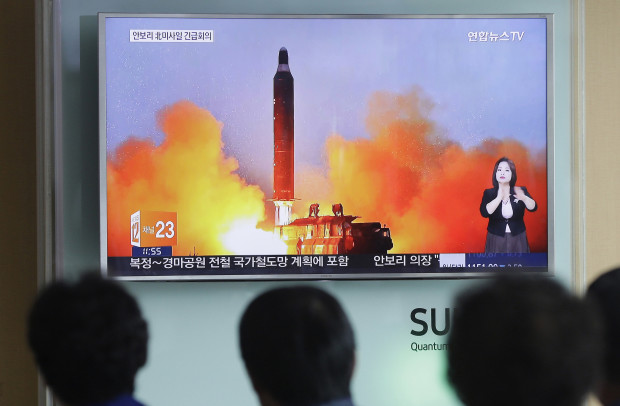North Korea fired ballistic missiles into Japan waters — Abe

In this June 23, 2016, file photo, people watch a TV news channel airing an image of North Korea’s ballistic missile launch published in North Korea’s Rodong Sinmun newspaper at the Seoul Railway Station in Seoul, South Korea. North Korea on Monday, March 6, 2017, fired “several” banned ballistic missiles that flew about 1,000 kilometers (620 miles) into waters off its east coast, South Korea’s military said, an apparent reaction to huge military drills by Washington and Seoul that Pyongyang insists are an invasion rehearsal. AP
SEOUL, South Korea — North Korea on Monday fired “several” banned ballistic missiles that flew about 1,000 kilometers into waters off its east coast, South Korea’s military said, an apparent reaction to huge military drills by Washington and Seoul that Pyongyang insists are an invasion rehearsal.
It was not immediately clear what type of missile was fired or the exact number but Japan said Pyongyang launched four missiles, three of which landed in Japanese-controlled waters.
“North Korea today fired four ballistic missiles almost simultaneously and they flew some 1,000 kilometres (620 miles),” Prime Minister Shinzo Abe said in parliament.
“Three of them landed in our country’s Exclusive Economic Zone (EEZ),” Abe said.
Pyongyang has staged a series of missile test-launches of various ranges in recent months. The ramped-up tests come as leader Kim Jong Un pushes for a nuclear and missile program that can deter what he calls U.S. and South Korean hostility toward the North.
Article continues after this advertisementSeoul and Washington call their military drills on the Korean Peninsula, which remains in a technical state of war because the 1950-53 Korean War ended with an armistice and not a peace treaty, defensive and routine.
Article continues after this advertisementThe South’s Joint Chief of Staff said in a statement that Monday’s launches were made from the Tongchang-ri area in North Pyongan province. The area is the home of the North’s Seohae Satellite Station where it has conducted prohibited long-range rocket launches in recent years.
The North hates the military drills, which run until late April and which analysts say force its impoverished military to respond with expensive deployments and drills of their own. An unidentified spokesman for the North’s General Staff of the Korean People’s Army said last week that Pyongyang’s reaction to the southern drills would be the toughest ever but didn’t elaborate
North Korea test-launched a new intermediate-range missile in February and conducted two nuclear tests last year. There has also been widespread worry that the North will conduct an ICBM test that, when perfected, could in theory reach U.S. shores. Washington would consider such a capability a major threat.
The United States has 28,500 troops stationed in South Korea as a deterrent against a potential aggression from the North. CBB